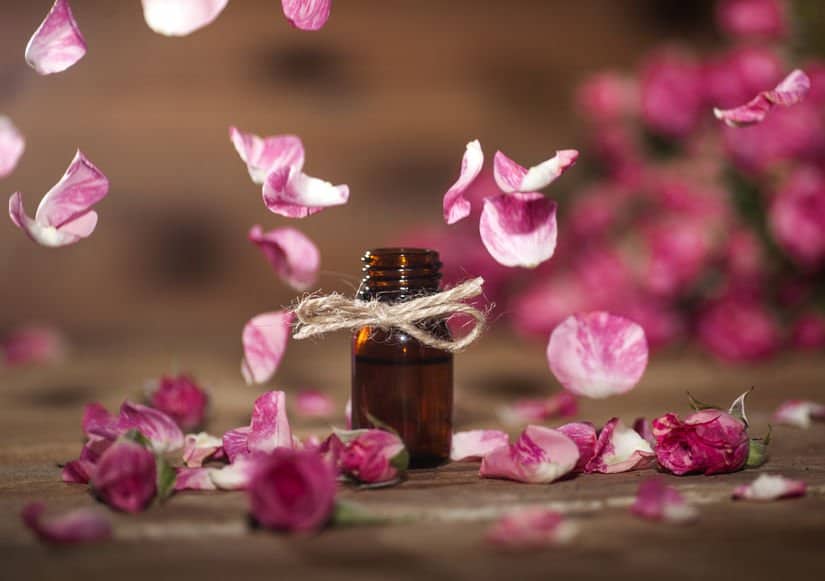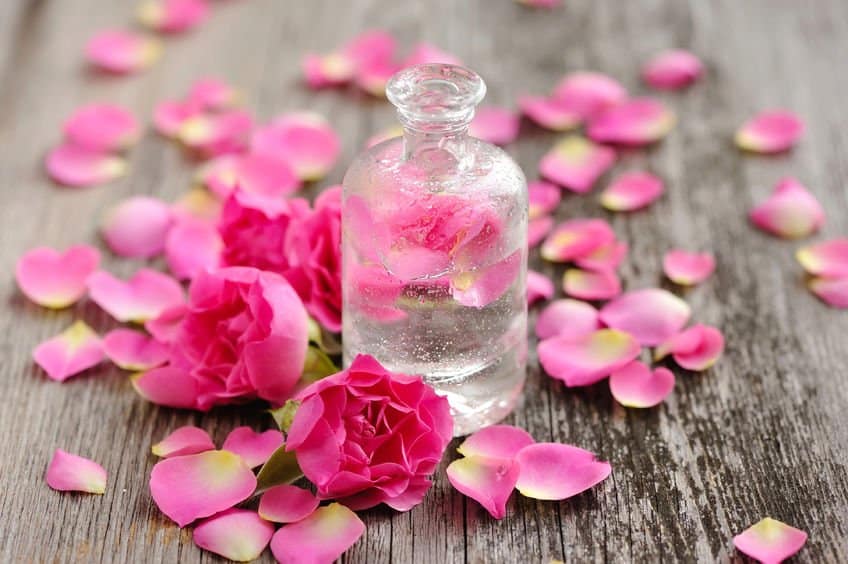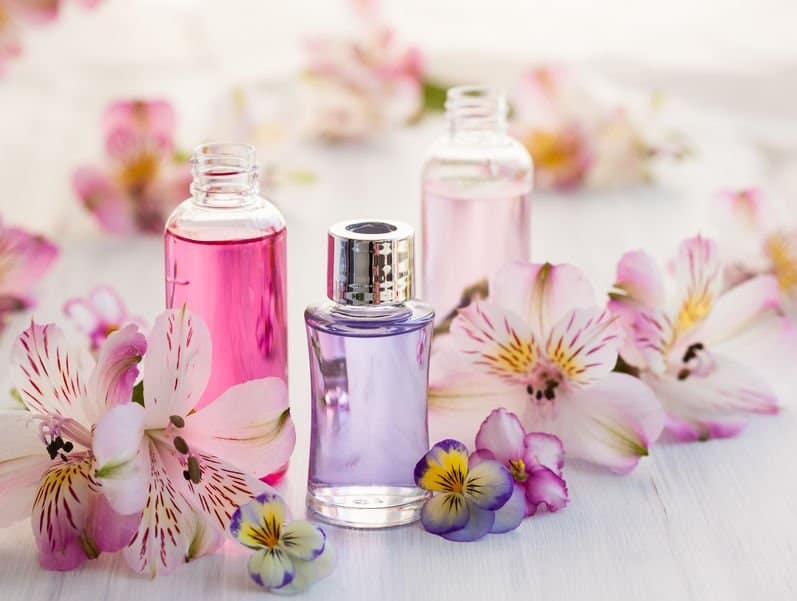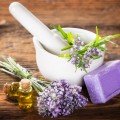
Who knew that the mysterious, floral and aromatic rosewater is one of those fascinating ingredients that you either love or hate. Although it may sound exotic, not everyone knows what to do with it. Can you imagine adding it to your food? This sounds off-putting as it may feel like eating perfume.
I must admit that I only developed a liking for rosewater after I came across its multiple health benefits. I found out that the key is to use rosewater in small amounts – a little goes a long way. I am sure that a lot of people dislike it purely because some brands taste awful. Others adore its fragrant, floral flavor in traditional dishes.
Just remember that rosewater made from premium quality roses is nicely fragrant and floral and will set you back upwards of $10. Do not go for the $3 ones…
So, What Exactly Is Rosewater?
Rosewater is the byproduct of distilling rose petals with steam in the process of making rose essential oil and perfume oil. This process dates back from Greece and Persia (now Iran) many centuries ago. At the time, it was the most popular flavor for use in dishes before vanilla was introduced.
Why Rosewater?
While most people associate rosewater with beauty products, it has actually been put to multiple uses over many centuries as briefly mentioned above.
In the Middle East, it was and still is, used as an ingredient in foods such as sweets, pastries, cookies, rice and dairy dishes.
As far back as the 15th century, it was used in Europe for hygienic reasons, specifically to wash hands before a meal.
Hindus also use rosewater as an ingredient for their religious ceremonies and rituals.
Ancient Egyptians used it in their cosmetics and perfumes. Even today, you will find many perfumes and beauty products containing rosewater as an ingredient.
The serious and effective properties of rosewater have led to its wide range of applications. For one, it has a pleasant smell, making it ideal for use in perfumes. Its relaxing fragrance is accompanied by a distinctive flavor that makes it popular in various dishes around the world. It has anti-inflammatory and anti-bacterial properties, hence its use in skincare and hair products.
First, let’s have a brief look at the various benefits of this age-old ingredient.
7 Benefits Of Rosewater

1. For the skin
There’s a reason why rosewater is immensely popular as a beauty product. For centuries, people have acknowledged that it god’s perfect ingredient for the skin. It hydrates, moisturizes and softens dry skin whether it is applied on its own or combined with other ingredients. It can also be used to even the skin tone, especially for people with oily skin. Check out my rosewater-based toning recipe below.
To boost the beauty power of rosewater, it can be combined with essential oils before being applied onto your skin. Refer to my essential oil-based recipe below for directions on how to create highly effective homemade skincare products.
If you are after commercial cosmetics with rosewater, avoid those that include chemicals like alcohol synthetic fragrances and preservatives, especially if you have sensitive skin.
2. For the hair
Not only is rosewater beneficial for your skin, but it’s excellent for the hair too. For one, it is antiseptic, which means that it protects your hair and can help against dandruff. It also gives the hair an added shine and softness.
A simple homemade rosewater recipe consists of rosewater in a spray bottle. A quick spray on the scalp and hair now and then will keep your hair looking glossy and smelling nice. You can also use my essential oil plus rosewater recipe for dry, damaged hair.
3. It is relaxing
The delicate floral aroma of rosewater has been proven to be physically and mentally relaxing. It reduces the level of stress and helps lower blood pressure.
What would be better than ending a busy day in a bath with rosewater? As the steam rises, it carries with it the aroma of rosewater, helping your mind and body relax. For an enhanced relaxation effect and a deep sense of peace, use rosewater in combination with a soothing essential oil like lavender. You just need a few capfuls of rosewater and a couple of drops of your favorite essential oil in a bath for a heavenly effect.
4. It freshens your breath
Rosewater is not just for topical use; it can be used as a natural mouth-wash alternative. Remember that rosewater has antibacterial properties, making it highly effective against bad breath caused by bacteria. It may not be as powerful as Listerine but it will leave you with a nice rosy breath. You can carry it with you and use it at work whenever you need a quick gargle, why not?
5. It is flavorful
As I previously mentioned, rosewater has been used as a food additive for centuries. Its unique taste and pleasant aroma has made it a popular ingredient in foods such as rice, pastries, sweets and even ice-cream.
Try incorporating rosewater in a few of your dishes and taste or smell the difference! Aside from solid foods, you can use rosewater in tea, drinking water, smoothies, cocktails, mocktails and other beverages.
Below, I have some rosewater food and drinks recipes.
6. Humidify the air
If your office or home feels a bit too dry, a spray of rosewater can help. Not only will it add moisture to the air, it makes the place smell nice! Due to its anti-bacterial properties, it will purify the air too, talk about hitting two birds with one stone…
7. As a drink
Did you know that drinking rosewater will hydrate your skin from the inside out and make it look beautiful and healthy. Rosewater has anti-aging properties and will help reduce wrinkles, fine lines and lighten dark spots.
Drinking rosewater can also help to calm nerves, relieve stress and anxiety as well as relieve digestion issues like bloating and constipation.
Due to its anti-bacterial properties, rosewater has been shown to provide relief from colds and flu and sore throats.
Now that I have enlightened you on the benefits of rosewater, why not make your own? Having said that, below are five easy rosewater recipes you can make in the comfort of your home. Some are based on essential oils, others use dried roses while others require fresh rose petals. Here we go…
6 Easy Rosewater Recipes You Can Make At Home

These recipes are simple and easy enough to make with ingredients readily available at your house. In case you don’t have some of the herbal ingredients, I would strongly recommend this online health store for your essential oils starter set, you can’t go past my own certified organic kit or for any other single essential oils, my new favorite brand.
Except for those recipes that are designed for use in drinks and foods, the other recipes have essential oils included for homeopathic benefit.
In case you are wondering the best way to blend essential oils, you can refer to my guide.
1. Beautiful Toner Recipe Using Rosewater
Ever wondered about making your own toner recipe to cleanse your face…well, there’s nothing easier than this rosewater toner. It is so gentle and soothing that you will instantly fall in love with it.
It is especially beneficial for people with oily skin as their skin tends to get clogged up easily. A toner clears the clogged pores, removes dirt and grime and leaves your skin feeling much smoother whilst giving your face a more youthful, vibrant look.
The recipe consists of roses and water only, I told you so…it could not be any simpler! You can add a few drops of essential oil if you feel the urge to (just like me) – this provides some additional moisturizing benefits. Note that this recipe has two parts; one for making the rosewater itself and the second for making the toner.
What you’ll need:
- Organic roses (7 stems with flowers)
- 1 to 1.5 liters of distilled water
- A spray bottle
- 6-8 drops of essential oil
Directions for the rosewater
Remove the petals from the stems and run them under warm water to clean them up thoroughly. Add the clean petals to a pot and add the distilled water until all the petals are covered. Start by adding 1 liter of water, increasing to 1.5 liters if needed; do not add any more water as this will over-dilute the rosewater. Place the pot on medium heat and let the water come to a simmer. Let it simmer until the petals have shed their color (20-30 minutes) and then strain the mixture to get your rosewater.
Directions for toner
Once the rosewater has cooled down, pour it into a spray bottle and then add 6-8 drops of essential oil. The choice of oil depends on your personal preference and the desired outcome. Some of the best oils for skincare include lavender, ylang ylang, patchouli and myrrh. If you are going to use multiple essential oils, use only a drop or two of each.
To mix thoroughly, shake the mixture in the spray bottle. It is now ready to use – you can spray it directly on your face or spray it on a cotton ball and then wipe your face with it. If you end up with excess rosewater (i.e. the spray bottle is too small), refer to the end of the article about my storing and preservation technique.
2. DIY Face Moisturizer With Rosewater
You can use the above recipe to make a rosewater-based skincare product. Feel free to experiment with different essential oils and even add other ingredients such as coconut oil, witch hazel and shea butter.
You can also use other ingredients to make rosewater including using dried petals (recipe below), crushed petals or using rose essential oil.
Alternatively, you can buy pure rosewater online and use it in your recipes. Just make sure it does not contain any alcohol, synthetic ingredients or harmful preservatives. Here is a rosewater facial cream moisturizer recipe.
What you’ll need:
- 200ml rosewater
- 4-6 drop of essential oil (lavender or frankincense)
- Shea butter
- 2 tsp stearic acid for thickening (optional)
- 1 ounce of organic beeswax
- 2 ounces coconut or jojoba oil
Directions
Make sure you have already prepared your rosewater from dried petals, fresh petals or crushed petals. Put the shea butter, beeswax, coconut oil and stearic acid in a heat-proof glass measuring cup. Place the cup in a hot water bath until the ingredients have melted.
Once the melted mixture has cooled, add the lavender or frankincense essential oil. As with the first recipe, you can adopt your favorite essential oil in the mixture. Add 4-6 drops if you are using a single essential oil and 1-2 drops of each if you are using multiple oils.
Pour into a larger bowl and use a hand mixer to blend your concoction. Gently stir in the rosewater, keep mixing for another 2-3 minutes until the rosewater is thoroughly mixed in. Increase the mixing speed until a nice and thick cream forms.
Keep the cream in a sterilized glass jar in the fridge and use within 2-3 weeks. You can keep it for longer if you add a natural preservative.
3. Homemade Rosewater Drink For Health Benefits
When preparing rosewater to drink, do not add any essential oils to the recipe. Additionally, use sterile kitchen utensils and work on a clean surface.
The best way to make rosewater for drinking is by using fresh petals steeped in hot water. Use the same recipe as that provided in Section 1 above. Once the rosewater is cooled down, you can either drink it on its own or use it in other beverages such as teas, cocktails, smoothies or simply water.
It is a good idea to prepare about a liter and store it for multiple uses. Just remember to use more petals as you add more water. For 1 to 1.5 liters, you can use 7 stems of fresh organic roses. For 2 to 2.5 liters, you can use 10 stems.
4. Simple Rosewater Recipe With Dried Roses
You can also use dried roses in place of fresh petals when preparing rosewater. Most stores, both locally and online, stock dried rose petals. My favorite organic one is here. Based on my personal experience, dried petals tend to produce a stronger flavor, making them ideal for making rosewater for use in cooking or drinking.
What you’ll need:
- 2 glass jars
- 1/4 cup dried rose petals
- 300ml hot distilled water
- Strainer
Directions
Add the hot distilled water to the dried petals in a jar. Cover it and let the petals steep for around 15 minutes. When you see them turn pale, put a strainer over another glass jar and empty the rosewater in it. Seal the jar and store it in the fridge.
5. Rosewater For Cooking
For cooking, I would suggest that you make rosewater using edible petals such as rosa centifolia and rosa damascene as they tend to have a much better taste. In fact, you can use any variety of rose petals as long as they are not sprayed with pesticide.
Use rosewater in various recipes as follows:
- cakes, muffins – instead of vanilla essence, use rosewater for a distinct taste and flavor.
- spring, summer fruits – rosewater goes well with fruits such as peaches, strawberries, and rhubarb.
- drinks – rosewater can be added to cocktails and mocktails for a simple touch of flavor and an added twist.
- meats – add rosewater to your exotic Moroccan or African dish for fragrance and a touch of aromatics.
Similar to rosewater for drinking, keep the preparation area and equipment clean. Additionally, consider making a big enough batch for several uses.
6. Rosewater Hair Recipes
A. Shampoo
A simple way to use rosewater as part of your hair care regime is to add it to your regular shampoo and wash as normal. You can add 2-3 tsp of rosewater per handful of shampoo.
B. After-shampoo rinse
Use half a cup to a cup of rosewater and apply to your scalp as a final rinse. It will condition, and improve your hair’s texture after only a few uses.
C. Rosewater for damaged hair
What you’ll need:
- 2 capsules vitamin E
- 1 cup rosewater
- 10 drops argan oil
Direction
Mix the above ingredients and apply to wet hair and scalp. Massage for at least five minutes and then shampoo and rinse as standard. Repeat 2-3 times per week for beautiful shiny hair.
How To Store And Preserve Rosewater?
Rosewater does not store for very long; I would say 1-2 weeks unless you add a preservative. So, keep it in the fridge immediately after preparation.
A natural preservative that can extend rosewater’s shelf life is dry orris root, though it may change the flavor and scent of your rosewater.
The long-lasting preservatives are however not natural. But don’t worry about it; there are various synthetic food preservatives that are completely safe. These include vitamin C, citric acid, benzoic acid (can affect taste) and sorbates (tasteless and odorless).
The ones to avoid include BHA (butylated hydroxyanisole), sulfites and sodium nitrite. Before using any preservative, do yourself a favor and do a full research on it to find out the correct way to use it, whether in your rosewater or any other DIY recipes.
Just remember that the safest option is making your own natural rosewater at home and using it within a week.




